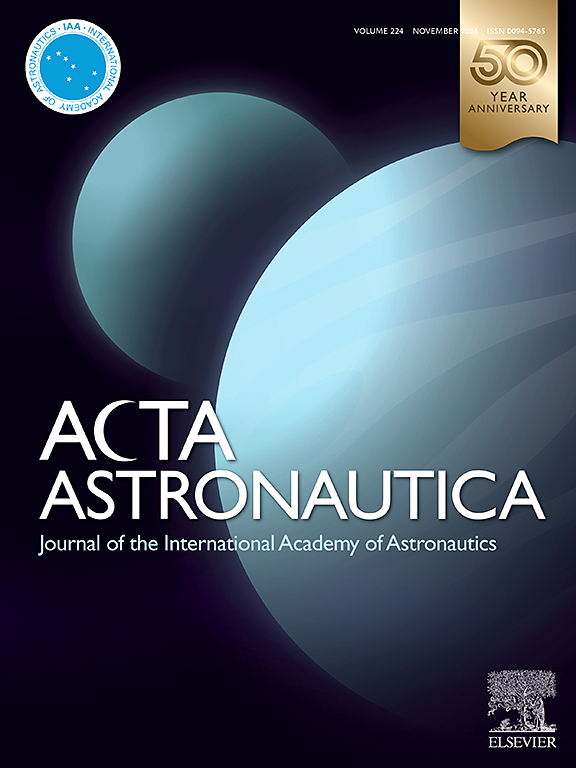Attitude control and online estimation of unknown mass properties for captured debris with a flexible spacecraft
IF 3.1
2区 物理与天体物理
Q1 ENGINEERING, AEROSPACE
引用次数: 0
Abstract
With more spacecraft launched in Low Earth Orbit (LEO) for educational and research purposes, their mission completion or mission failure results in an increasing number of inactive orbiting space bodies. These uncooperative bodies can lead to collision with other space systems, creating the need to actively remove debris for collision avoidance and to increase the availability of orbital slots. Solutions currently investigated see the use of robust control in robot manipulators and tethered nets to maneuver a main spacecraft and the attached unknown debris. Another solution is to employ cameras and a combination of image processing technologies and output feedback to estimate the inertia tensor of the space debris to then employ it in a model-based controller architecture. However, robust control techniques and vision-based estimation suffer from practical disadvantages, like the added complexity in the Reaction Control System (RCS) with extra onboard fuel for the former, and the added complexity in computer resources and extra sensors for the latter. In this investigation, an adaptive attitude controller for a spacecraft debris collector is proposed. The adaptive control law uses Integral Concurrent Learning (ICL) to learn, onboard, the mechanical properties of an unknown spacecraft target using measurements of the states of the system already available onboard. During the collection of the system states and inputs, a classic adaptive controller is implemented to guarantee bounded stability of the system. Through numerical simulations of a test-case scenario, it is shown asymptotic convergence of both the attitude tracking error and the estimation error of the unknown parameters of the captured debirs and the flexible appendage. The results are compared to the system response of a classic adaptive controller that does not include ICL to show the improvements in performance ICL brings to the attitude maneuvering.
柔性航天器捕获碎片的姿态控制与未知质量特性在线估计
随着越来越多的航天器在低地球轨道(LEO)发射用于教育和研究目的,它们的任务完成或任务失败导致越来越多的非活动轨道空间体。这些不合作的天体可能导致与其他空间系统发生碰撞,因此需要主动清除碎片以避免碰撞,并增加轨道槽的可用性。目前研究的解决方案是在机器人操纵器和系留网中使用鲁棒控制来操纵主航天器和附加的未知碎片。另一种解决方案是使用相机,结合图像处理技术和输出反馈来估计空间碎片的惯性张量,然后将其应用于基于模型的控制器架构中。然而,鲁棒控制技术和基于视觉的估计都有实际的缺点,比如前者的反应控制系统(RCS)的额外机载燃料增加了复杂性,而后者的计算机资源和额外传感器增加了复杂性。提出了一种航天器碎片收集器的自适应姿态控制器。该自适应控制律采用积分并行学习(ICL)方法,利用机载已有的系统状态测量值来学习未知航天器目标的力学特性。在系统状态和输入的收集过程中,采用经典的自适应控制器来保证系统的有界稳定。通过一个测试用例的数值模拟,证明了姿态跟踪误差和捕获碎片和柔性附件未知参数估计误差的渐近收敛性。将结果与不含ICL的经典自适应控制器的系统响应进行了比较,以显示ICL对姿态机动性能的改善。
本文章由计算机程序翻译,如有差异,请以英文原文为准。
求助全文
约1分钟内获得全文
求助全文
来源期刊

Acta Astronautica
工程技术-工程:宇航
CiteScore
7.20
自引率
22.90%
发文量
599
审稿时长
53 days
期刊介绍:
Acta Astronautica is sponsored by the International Academy of Astronautics. Content is based on original contributions in all fields of basic, engineering, life and social space sciences and of space technology related to:
The peaceful scientific exploration of space,
Its exploitation for human welfare and progress,
Conception, design, development and operation of space-borne and Earth-based systems,
In addition to regular issues, the journal publishes selected proceedings of the annual International Astronautical Congress (IAC), transactions of the IAA and special issues on topics of current interest, such as microgravity, space station technology, geostationary orbits, and space economics. Other subject areas include satellite technology, space transportation and communications, space energy, power and propulsion, astrodynamics, extraterrestrial intelligence and Earth observations.
 求助内容:
求助内容: 应助结果提醒方式:
应助结果提醒方式:


